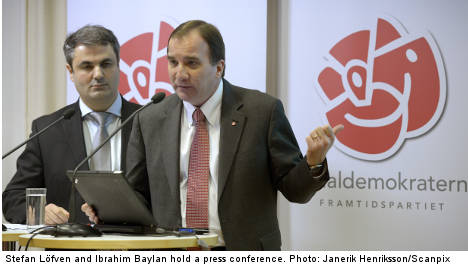As soon as the economy improves, steps should be taken to ensure that all municipalities in Sweden offer free preschool places for all toddlers, regardless if their parents or legal guardians are gainfully employed, unemployed or on parental leave, the congress established.
The party also wants to scrap the childcare allowance for parents or guardians of preschool-age children.
Further, the Social Democrats want to make high school (gymnasium) attendance compulsory. Swedish high school corresponds to grades 10 to 12 and is currently not mandatory.
The aim is to ensure that all Swedes have a complete high school degree before the age of 25.
According to the Social Democrats, by 2020, the number of 18- to 24-year-olds without high school degrees should be halved and 50 percent of 30- to 34-year-olds should have completed at least two years of higher education.
To achieve this, the Social Democrats want to increase the number of higher education places and to reintroduce work experience as a valid merit for university applicants. The party also wants to review the age limit for claiming student loans.
In his speech at the congress, Karl-Petter Thorwaldsson, head of Sweden’s Trade Union Confederation (LO), outlined several measures to reduce unemployment, including investing in vocational courses and increasing housing construction.
If housing construction increased at a proper rate it could lead to the creation of 35,000 new jobs, said Thorwaldsson.
Earlier, the congress also determined that the municipalities should have “decisive impact” when it comes to establishing privately-run, publicly-funded free schools (friskolor).
However, the National Free School Committee (Friskolekommittén) said it would be difficult to reach an agreement on this across the right and left blocks.
The head of the Free School Committee, Lars Leijonborg, told Sveriges Radio (SR) that the Social Democrats’ decision is practically a veto which renders any cross-party deal on the future of free schools impossible.
The committee was close to a deal, said Leijonborg, with six parties ready to reach an agreement.
But Social Democrat education policy spokesman Ibrahim Baylan dismissed claims that the Social Democrats were vetoing a deal, saying he would not be surprised if the Committee used this as a “pretext” for failing to reach a decision.
“The really big problem with the Free School Committee has been that we haven’t really known what the centre-right government’s premise has been,” Baylan told SR.
TT/The Local/nr Follow The Local on Twitter



 Please whitelist us to continue reading.
Please whitelist us to continue reading.
Member comments